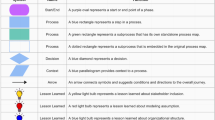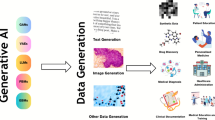Abstract
This position paper argues that the lack of take-up of management science (MS) modelling in health care is a particularly severe example of a more general problem for MS, articulated by many authorities. We relate this severity to the extreme complexity of the health care domain, which might be termed ‘hypercomplexity’. We argue that, for a variety of reasons, the health care domain is different to other domains in this respect, and we explore the mechanisms by which hypercomplexity might have inhibited the use of modelling within the domain. We conclude with some tentative suggestions for making progress, including the possibility of taking deliberate steps to reduce health care hypercomplexity.
Similar content being viewed by others
References
Ackoff RL (1979a) The future of operational research is past. Journal of the Operational Research Society 30 (2), 93–104.
Ackoff RL (1979b) Resurrecting the future of operational research. Journal of the Operational Research Society 30 (3), 189–199.
Barach P and Johnson JK (2006) Understanding the complexity of redesigning care around the clinical microsystem. Quality & Safety in Healthcare 15 (Supplement 1), i10–i16.
Baxter G. (2010) White paper: complexity in health care. The UK National Research & Training Initiative in Large Scale Complex IT Systems.
Brailsford SC et al (2013) Overcoming the barriers: a qualitative study of simulation adoption in the NHS. Journal of the Operational Research Society 64 (2), 157–168.
Brailsford SC, Harper PR, Patel B and Pitt M (2009) An analysis of the academic literature on simulation and modelling in healthcare. Journal of Simulation 3 (3), 130–140.
Calvano CN and John P (2004) Systems engineering in an age of complexity. Systems Engineering 7 (1), 25–34.
Checkland PB (1981) Systems Thinking, Systems Practice. Wiley, Chichester, UK.
Choo CW (1998) The Knowing Organization: How Organizations Use Information to Construct Meaning, Create Knowledge, and Make Decisions, Oxford University Press, New York, USA.
Clancy TR and Delaney C-W (2005) Complex nursing systems. Journal of Nursing Management 13 (3), 192–201.
Cramp DG and Carson ER (2009) Systems thinking, complexity and managerial decision-making: an analytical review. Health Services Management Research 22 (2), 71–80.
Currie G and Suhomlinova O (2006) The impact of institutional forces upon knowledge sharing in the UK NHS: the triumph of professional power and the inconsistency of policy. Public Administration 84 (1), 1–30.
Dawson S (1999) Managing, organising and performing in health care: what do we know and how can we learn? In Organisational Behaviour in Health Care: The Research Agenda (Mark AL and Dopson S, Eds), Palgrave Macmillan, Basingstoke, UK.
Fone D et al (2003) Systematic review of the use and value of computer simulation modelling in population health and healthcare delivery. Journal of Public Health Medicine 25 (4), 325–335.
Gabbay J and le May A (2010) Practice-Based Evidence for Healthcare: Clinical Mindlines. Routledge, Abingdon, UK.
Greenhalgh T, Potts HWW, Wong G, Bark P and Swinglehurst D (2009) Tensions and paradoxes in electronic patient record research: a systematic literature review using the meta-narrative method. Milbank Quarterly 87 (4), 729–788.
Gkeredakis E et al (2011) Mind the gap: understanding utilisation of evidence and policy in health care management practice. Journal of Health Organization and Management 25 (3), 298–314.
Greenhalgh T, Stramer K, Bratan T, Byrne E, Russell J and Potts HWW (2010) Adoption and non-adoption of a shared electronic summary record in England: a mixed-method case study. BMJ 340, c3111.
Guerriero F and Guido R (2011) Operational research in the management of the operating theatre: a survey. Health Care Management Science 14 (1), 89–114.
Harper PR and Pitt MA (2004) On the challenges of healthcare modelling and a proposed project life cycle for successful implementation. Journal of the Operational Research Society 55 (6), 657–661.
Haskins C, Forsberg K and Krueger M (2007) INCOSE Systems Engineering Handbook. Version 3.1. International Council on Systems Engineering.
Henshaw MJ, Gunton DJ and Urwin EN (2009) Collaborative academic-industry research approach for advancing systems engineering. Proceedings of the Seventh Annual Conference on Systems Engineering Research (CSER 2009), Loughborough University, 20–23 April, Loughborough, UK.
Jahangirian M, Eldabi T, Naseer A, Stergioulas L and Young T (2010a) Simulation in manufacturing and business: a review. European Journal of Operational Research 203 (1), 1–13.
Jahangirian M et al (2010b) Simulation in health care: lessons from other sectors. Operational Research: An International Journal 12 (1), 45–55.
Jahangirian M et al (2011) A rapid review method for extremely large corpora of literature: applications to the domains of modelling, simulation, and management. International Journal of Information Management 31 (3), 234–243.
Jun JB, Jacobson SH and Swisher JR (1999) Application of discrete-event simulation in health care and clinics: a survey. Journal of the Operational Research Society 50 (2), 109–123.
Kirby MW (2003) Operational Research in War and Peace: The British Experience from the 1930s to 1970. Imperial College Press, London, UK & Operational Research Society, Birmingham, UK.
Klein JH (1994) Cognitive processes and operational research: a human information processing perspective. Journal of the Operational Research Society 45 (8), 855–866.
Perrow C (1999) Normal Accidents: Living with High-Risk Technologies. Princeton University Press, Princeton, New Jersey, USA.
Plsek PE and Greenhalgh T (2001) The challenge of complexity in health care. BMJ 323, 625–628.
Runciman B, Merry A and Walton M (2007) Safety and Ethics in Healthcare: A Guide to Getting it Right. Ashgate, Aldershot, UK.
Senge PM (1990) The leader’s new work: building learning organizations. Sloan Management Review 32, 7–23.
Simpson J and Simpson M (2011) Complexity reduction: a pragmatic approach. Systems Engineering 14 (2), 180–192.
Stevens R, Jackson K, Brook P and Arnold S (1998) Systems Engineering – Coping with Complexity. Prentice Hall Europe, Harlow, UK.
Sussman JM (2002) Collected views on complexity in systems. Massachusetts Institute of Technology, Engineering Systems Division, Working paper ESD-WP-2003-01.06-ESD Internal Symposium.
van de Ven AH and Johnson PE (2006) Knowledge for theory and practice. Academy of Management Review 31 (4), 802–821.
Williams T (2008) Management Science in Practice. Wiley, Chichester, UK.
Acknowledgements
The authors are grateful to the two referees appointed by the journal for their helpful and insightful comments on the original submission of this paper.
Author information
Authors and Affiliations
Corresponding author
Additional information
The MATCH project (2003–2013) has explored questions of value as they relate to health care technology, while the feasibility stage of the RIGHT project (2007–2009) was concerned centrally with modelling in health care services. Between them, these two projects attracted around £15M of funding, the bulk of it coming from a set of large Research Council grants, and have involved researchers from several universities in the United Kingdom (Birmingham, Brunel, Cambridge, Cardiff, Nottingham, Southampton, and Ulster). In addition, both the authors are contributors to the Cumberland Initiative, a grouping of staff from 16 or more universities, committed to providing research support for the promotion of the greater use of management science, including operational research and engineering approaches, to health care.
Rights and permissions
About this article
Cite this article
Klein, J., Young, T. Health care: a case of hypercomplexity?. Health Syst 4, 104–110 (2015). https://doi.org/10.1057/hs.2014.21
Received:
Revised:
Accepted:
Published:
Issue Date:
DOI: https://doi.org/10.1057/hs.2014.21




